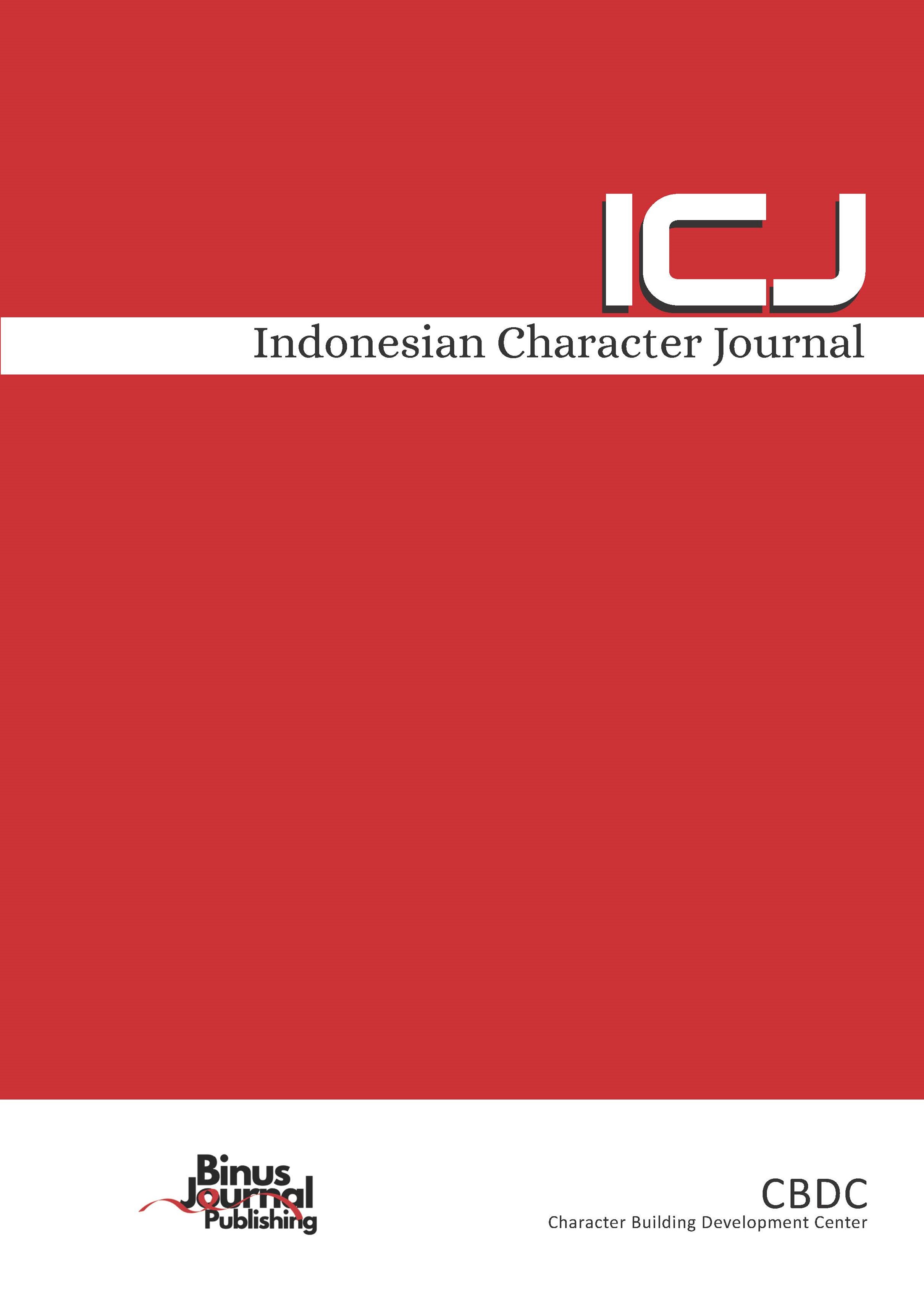Good Inspiring The Strength of Enterpreneurship Character
DOI:
https://doi.org/10.21512/icj.v1i1.10247Keywords:
Good Inspiring, Entrepreneurship CharacterAbstract
The inspiration for the strength of entrepreneurial character is the breath or encouragement to continue to think creatively from someone in creating something new and different. Inspiration for entrepreneurial character can occur within the framework of cultural interactions that flow naturally and informally with people's lives. This research aims to map the inspiration of entrepreneurial power and analyze the factors that underlie the process of cultural interaction. The research was designed in a qualitative design with data collection methods in the form of observation, in-depth interviews. Data analysis was carried out by manual reduction, display and interpretation of data. The results of the study show that inspiration runs in the entrepreneurial process which is characterized by the strength of social interaction that is increasingly attractive and gives interest so that the business is progressing and growing every year. The inspiration for the power of entrepreneurship cannot be separated from the role of cultural interaction presented by the entrepreneur personally, both formally and informally. The limitation of this study is that the scope of the study is limited to one community group. It is possible to find comparisons by studying in a wider space.
References
Adnan Hakim. (2010). Karakteristik kewirausahaan, Lingkungan Bisnis dan Kapabilitas Organisasi: Pengaruhnya Terhadap Strategi Bisnis dan Kinerja Usaha (Kajian Pada Koperasi si Sulawesi Tenggara). Jurnal Aplikasi Manajemen, Volume 8, Nomor 1, Februari
Balansudaram, N. (2008). [PDF] Characteristics of entrepreneurs: A comparative study of small scale entrepreneurs of Srilankan and Bangladesh | Semantic Scholar. Lex et Scientia International Journal. https://www.semanticscholar.org/paper/Characteristics-of- Entrepreneurs%3A-A-Comparative-of- Nimalathasan/89bb965a35408b48c69b497c7066a0fe897c0cec
Binford, L. (1968). Post-Pleistocene Adaptations. Dalam New Perspective in Archaelogy. ed. L.R. Binford dan S.R. Binford. 313^2. Chicago: Aldine
Bygrave, William D. (2011). Entrepreneurship 2 Edition. Singapore: John Wiley and Sons.
Cambridge Dictionary. (n.d.). Word. Retrieved July 21, 2018, from https://dictionary.cambridge.org/dictionary/english/word.
Dani Farhalah, https://www.dictio.id/t/apa-yang-dimaksud-dengan-inspirasi/17046, March 9, 2020, 7:07 pm.
Devita Anggita. (2017). Enterpreneurship Dalam Perspektif Ekonomi Islam, (Studi Pada Pengusaha Rumah Makan Padang Putri Minang), Skripsi, Fakultas Ekonomi Dan Bisnis Islam, Universitas Islam Negeri Alauddin Makassar
Ebta Setiawan (2012-2021) Kamus Besar Bahasa Indonesia (KBBI) Kamus versi online/daring (dalam jaringan), https://kbbi.web.id/inspirasi, Badan Pengembangan dan Pembinaan Bahasa (Pusat Bahasa).
Edelweis Lararenjana. (2021). https://www.merdeka.com/jatim/apa-itu-interaksi-sosial-budaya-dan-manfaatnya-dalam-kehidupan-wajib-tahu-kln.html
Elfindri; Ayunda, Desri; Saputra, Wiko. (2010). Minang Entrepreneurship. Jakarta: Baduose Media.
Geertz, C. (1967). The Cerebral Savage: On the World of Claude Levi - Slrauss. Encounter 28
Hastuti, P. C., Thoyib, A., Troena, E. A., & Setiawan, M. (2015). The Minang entrepreneur characteristic. Procedia Social and Behavioral Sciences, 211, 819-826.
Ilham Setiawan. (2016). Bertahan Hidup Dan Tumbuh: Dinamika Kewirausahaan Perantau Minangkabau Di Yogyakarta, (studi kasus wirausaha perantau minang di yogyakarta), Skripsi, Yogyakarta, Universitas Islam Indonesia, Fakultas Ekonomi.
Ilham Tanjung. (2021) https://www.indonesiana.id/read/152324/etos-harga-diri-persaingan-dan-kerja-keras-dalam-karakteristik-wirausaha-minangkabau
Jevi Nugraha, https://www.merdeka.com/jateng/inspirasi-adalah-ide-yang-muncul-dari-pikiran-berikut-penjelasan-lengkapnya-kln.html, 22 Juli 2021 12:00.
Keesing, R.M. (1970) Toward a model of role analysis. A Handbook of Method in Cultural Anthopo logy. ed. R. Naroll, R. Cohen, 423-53. Garden City, New York: Natural History Press.
Meggers, B.J. (1971). Amazonia: Man and Nature in a Counterfeit Paradise. Chicago: Aldine.
Muluk, H., & Murniati, J. (2007). Konsep kesehatan mental menurut masyarakat etnik Jawa dan
Minangkabau. Jurnal Psikologi Sosial, 13(2), 167-181.
Munir, M. (2013). Hidup di rantau dengan damai: nilai-nilai kehidupan orang Minangkabau dalam menyesuaikan diri dengan lingkungan budaya baru, Prosiding The 5th International Conference on Indonesian Studies: Ethnicity and Globalization, Yogyakarta, Indonesia, 13-14 Juni 2013. Yogyakarta: Fakultas Ilmu Budaya Universitas Indonesia.
Muslimin Kara dan Jamaluddin. 2010. Pengantar Kewirausahaan, (Makassar: Alauddin Press)
Rahman, H. (2016). Merantau - an informal entrepreunial learning pattern in the culture of Minangkabau tribe in Indonesia, International Conference on Entrepreneurship 2016, Tangerang, Indonesia, 17 Maret 2016. Tangerang: Universitas Pelita Harapan.
Benedicta Prihatin Dwi, Riyanti. (2003). Kewirausahaan Dari Sudut Pandang. Psikologi Kepribadian. Jakarta : Grasindo
Soerjono Soekanto.2012. Sosiologi Suatu Pengantar. Jakarta: Rajawali Pers, 55-56.
Stephan, U., & Uhlaner, L. M. 2010. Performance-based vs socially supportive culture: A crossnational study of descrip- tive norms and entrepreneurship. Journal of International Business Studies, 41(8): 1347–1364
Stark, A. (2013). The matrilineal system of the minangkabau and its persistence throughout history: A structural perspective. Southeast Asia: A Multidiciplinary Journal, 13, 1-13.
Miftah Thoha. (1996). Perilaku Organisasi, Konsep Dasar dan Aplikasinya. PT. Raja Grafindo Persada, Jakarta, 24
Thrash, T. M., & Elliot, A. J. (2003). Inspiration as a psychological construct. Journal of personality and social psychology.
Wawan Kurniawan. (2020). Mengenal Konsep Inspirasi dalam Psikologi, https://www.indopositive.org/2020/10/pengertian%20inspirasi%20dalam%20psikologi.html
Downloads
Published
Issue
Section
License
Copyright (c) 2024 Servasius Balok

This work is licensed under a Creative Commons Attribution-ShareAlike 4.0 International License.
Authors who publish with this journal agree to the following terms:
a. Authors retain copyright and grant the journal right of first publication with the work simultaneously licensed under a Creative Commons Attribution License - Share Alike that allows others to share the work with an acknowledgment of the work's authorship and initial publication in this journal.
b. Authors are able to enter into separate, additional contractual arrangements for the non-exclusive distribution of the journal's published version of the work (e.g., post it to an institutional repository or publish it in a book), with an acknowledgment of its initial publication in this journal.
c. Authors are permitted and encouraged to post their work online (e.g., in institutional repositories or on their website) prior to and during the submission process, as it can lead to productive exchanges, as well as earlier and greater citation of published work.
Â
USER RIGHTS
 All articles published Open Access will be immediately and permanently free for everyone to read and download. We are continuously working with our author communities to select the best choice of license options, currently being defined for this journal as follows: Creative Commons Attribution-Share Alike (CC BY-SA)
Â








 This work is licensed under a
This work is licensed under a 